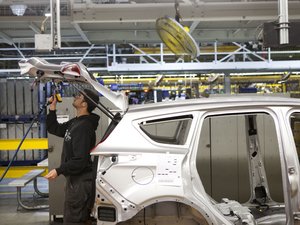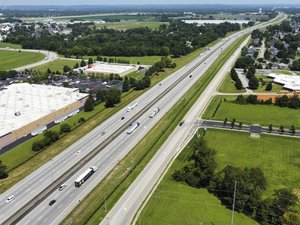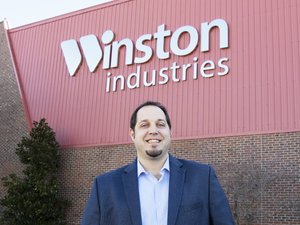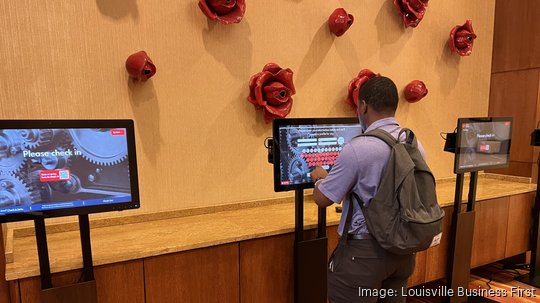
Roughly a year ago, the Kentucky-based Metals Innovation Initiative (MI2) formed, so the two-day “Factory of the Future” Conference that took place in Louisville on Sept. 5-6 served partly as a one-year anniversary of its formation — a platform for its future.
Taking place at the Louisville Marriott East, I stopped by Wednesday morning to see what I could glean from the inaugural event, which those in charge hope will help cement Kentucky as one of the pre-eminent epicenters of metal-related innovative solutions.
“Basically, for us, it tells the whole world … that the metals hub of the world is really right here in Kentucky. We have some of the leading companies in the world,” said Jeff Noel, secretary of the Kentucky Cabinet for Economic Development. “By collectively bringing those people together, we help those businesses, and we help the people who work for them.”
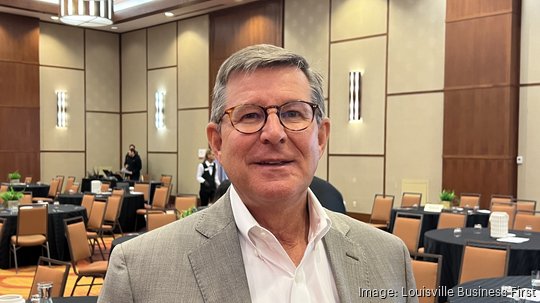
I spoke with Noel after he provided opening comments on Wednesday to the approximately 250 attendees who had gathered for the conference, many of them from companies based or with heavy presences in the commonwealth.
MI2, based out of the Western Kentucky University Innovation Campus in Bowling Green, Kentucky, began with eight founding member companies, all of which have strong ties to the metal processing ecosystem in Kentucky that happens to be the fourth largest in the country. Recently, four others have signed on as members: Ball, ElectraMet, Hitachi Vantara and Trace Die Cast.
According to MI2, more than 80 metals-related announcements have led to more than $4 billion in investments and 4,000 full-time jobs in the state, which has more than 250 facilities connected to the metals industry. Those factories hold more than 36,000 employees, composing approximately 14% of the state’s manufacturing workforce.
Seeing the signs
The first thing that stood out to me was the number of touch screens that were found throughout the registration area. Conference goers could sign in digitally instead of going to a traditional registration table. This is the same technology that Bowling Green, Kentucky-based Transmission has begun incorporating into factories across the industry.
The company is one of the spinoffs created by Eyeconic holding company of Jeremy Jacobs, whom I spoke with for my recent cover story about the rising tech scene in Bowling Green.
Transmission co-founder and CEO Jeff Fiala told me that the company’s Check-In Kiosk (used for visitor reporting and orientations) and its FactoryTV (provides employee-facing digital signage in break rooms and other areas) is collectively in around 1,000 factories at the moment. Jacobs told me the company could easily double that number in less than two years with those gathered at the conference alone.
The signs, Fiala, said provide a way for immediate relief to address the high turnover rate of workers at factories by allowing employees to be more informed, feel more part of the process at the factory and be able to spend their time more on the task at hand and less on non-related tasks (such as visitor management).
Time for flight
On Tuesday, the conference goers listened to four finalists who were competing with the right to earn an $100,000 investment from the Sheltowee Venture Fund, following a due diligence period, and the opportunity to launch a pilot project with one of the founding metal processing companies.
The winner out of 54 applicants was SeebeckCell Technologies Inc., a business based in Houston that “develops and manufactures the liquid-based thermoelectric cell that directly converts industrial waste heat into electricity and provides it for on-site electrical instruments,” according to its LinkedIn profile.
The others that presented, though, will have plenty of opportunities to collaborate as well. That’s what I was told by Andy Ishmael, vice president of business at Louisville-based Tri-Arrows Aluminum, one of the original eight founding member companies of MI2. He was part of a panel of four judges.
“The real goal was how do we get … not just the winner,” Ishmael said, “But some of the other finalists in front of the entire network to find opportunities for pilots and eventual work in the future.”

